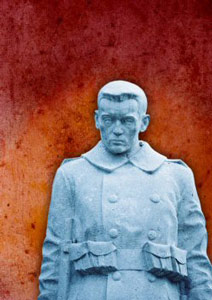| Dramatic music theatre at its very height. |
Welsh National Opera |
| Welsh National Opera- Mazeppa , Wales Millennium Centre , May 23, 2006 |
 A musicologist turning the pages of an original Tchaikovsky manuscript will almost certainly feel a small tremor of excitement and appreciate that he has very fine example of the art of music composition in his hands but music is much more than black ink marks made with a gold nib on coarse paper. It has to resound through the aged brown wood of the strings and woodwind instruments and be burnished by the brass. Only consummate musicianship will bring the music alive and enable it to be absorbed into our senses and our enjoyment.
A musicologist turning the pages of an original Tchaikovsky manuscript will almost certainly feel a small tremor of excitement and appreciate that he has very fine example of the art of music composition in his hands but music is much more than black ink marks made with a gold nib on coarse paper. It has to resound through the aged brown wood of the strings and woodwind instruments and be burnished by the brass. Only consummate musicianship will bring the music alive and enable it to be absorbed into our senses and our enjoyment.There may well be no finer artist and conductor than the dazzling Alexander Polianichko able to ensure that Tchaikovsky’s music will soar up into the vast Donald Gordon Theatre completely surround, seduce and excite us for the full three hour plus of this most moving production. His particular delicate skill of pitching the music so perfectly just below the singing meant that every word, though in Russian and drenched in Slavonic passion, was crystal clear. Mazepa, an ageing but nevertheless a virile and dynamic Cossack commander has been friends since childhood with Kochubei, a Ukrainian leader. Kochubei’s daughter Mariya sings of her love for the much older Mazepa. He is handsome and powerful and she is besotted by him and she feels this unequal love quite desperately. Moscow born, Tatiana Monogarova expresses every complex nuance of this role superbly. Her singing is clear and passionate, her acting compelling and totally believable. Her mother, Lyubov, is sung by Marianna Tarasova, from St Petersburg who completes the Russian trio in the production. Such was the feel of Cossacks and caviar across the whole atmosphere of the evening, despite the unnecessary updating of the setting, the mind’s eye continually saw the sabres flashing. Home-grown Robert Hayward as Mazepa, Israeli, Gidion Saks as the father of the headstrong Mariya and American tenor Hugh Smith all share a real empathy and understanding of Tchaikovsky’s music that we might well be in the auditorium of the Mariinsky Theatre. Kochubei entertains Mazepa, there’s a bit of a party but here again the modern setting strives to undermine the gusto of the folk singing and dancing, but it will take more than some unprepossessing scenery to hold back the enthusiasm of the WNO’s great chorus. Robert Hayward sings Mazepa wtih great force and dignity, whilst at the same time making us totally aware of the conceit and ruthlessness of this covetous and immoral man. He asks for Mariya’s hand, her father is outraged. He asks her to make her own choice. She leaves with Mazepa. Marianna Tarasova is perfect in showing us the grief and frustration of a mother who has lost her daughter. Mother and father seek their revenge. They send a message to Peter the Great, that Mazepa is plotting to join with the Swedish king in an attempt to gain independence for the Ukraine. Here we see the faint spark that brings about the up-dating of the opera. Their plan backfires, their story is not believed. Kochubei is now Mazepa’s prisoner and is to be executed on the next day. This second act, though so sickening in its narrative, is so sublime in its performance. A bouquet of black roses. The coldness of the executioner, the evil inside Mazepa, the sincerity and acceptance of Kochubei, the pleading of mother to daughter to intercede, the daughter confirming her love for the tyrant. All dramatic music theatre at its very height. The story of the opera is based on Pushkin’s epic poem Poltáva. Before the curtain rises on the final act the orchestra recreate the Battle of Poltáva. Again the orchestra, Polianichko and Tchaikovsky are at one. There is much of the evening that could be greatly enjoyed with one’s eyes closed, as much of the music reaches near purity. When the curtain rises, we see the ruins of the city. Mariya has gone mad, the uplifting and captivating voice of tenor Hugh Smith is sadly unable to bring any relief. The music brings us to an enormously touching and beautiful close. |
Reviewed by: Michael Kelligan |
This review has been read 1634 times There are 111 other reviews of productions with this title in our database:
|
